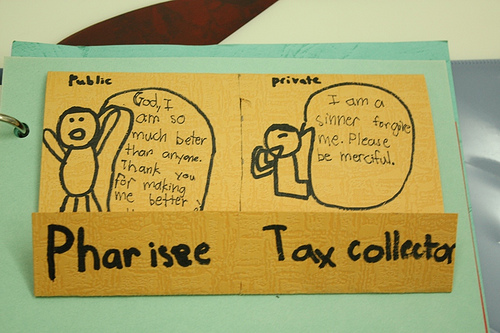View a 1987 television appearance of Rev. Dr. Robert L. Lindsey in which he shares his understanding of Jesus’ concept of the Kingdom of Heaven and Jesus’ division of redemption history into three distinct periods.
The Numbers Game: Bible Codes (Numerology and Gematria)

Biblical writers infrequently consciously used numerical patterns or codes in their compositions.
The “King James Only” Debate

Have you read a book called New Age Bible Versions by Gail Riplinger? She claims that the only reliable translation of the Bible is the King James Version.
Is the Search for Literary Sources of the Synoptic Gospels Futile?

Indeed, the search for literary sources that may be reflected in a piece of writing can be risky business. In the case of the Synoptic Gospels, however, we possess multiple accounts of the same events—events that originally occurred in a Hebrew-speaking environment, but were eventually recorded in Greek.
The “Hypocrisy” of the Pharisees

Without reading the Scriptures carefully, and without a familiarity with Second Temple-period extra-biblical sources, a simple reader of the New Testament might assume that a majority of the Pharisees were hypocrites and that the Pharisees as a movement were indeed a “brood of vipers.” As a result of this common Christian assumption, the word “Pharisee” has become a synonym for “hypocrite” in the English language.
Excerpts from David Flusser’s The Sage from Galilee

The Sage from Galilee is Flusser’s biography of Jesus (written in collaboration with Flusser’s student, R. Steven Notley).
Why Learn to Speak a Dead Language?
Why would anyone in his or her right mind want to speak a “dead” language, a language that no one speaks? The answer: Because only by speaking a language does one internalize it, and it was high time, Randall and I felt, having tasted fluency in Hebrew, that we should gain an active knowledge of Koine Greek.
What’s Happening to the Holy Tongue?
English speakers who live in Israel are reminded regularly of the inroads English is making in Hebrew.
My Knowledge of Greek: An Embarrassment for Too Long!
Until recently, I, a New Testament scholar, was often embarrassed by my level of Greek fluency, even after 35 years of studying this ancient biblical language using the traditional grammatical approach. A lack of true fluency in Greek, active knowledge of the language as opposed to passive, is a scourge. Finding myself in this situation, my disappointment was real, but it was kept hidden from my students.
Hebrew as a Spoken Language in First-century Israel

Hebrew was a living language in first-century Israel, part of a multilingual environment (Hebrew, Aramaic and Greek).
Views That Have Vanished: The Photographs of David Bivin

Todd Bolen (founder of BiblePlaces.com) has created a digital collection from the best of my photographs.
Remembering Robert L. Lindsey
The late Robert L. Lindsey, the late Professor David Flusser, and their colleague, the late Professor Shmuel Safrai collaborated to birth a new school of synoptic research. In 1985 the “Jerusalem School” became a legal entity (an Amutah) in Israel, and has now joined the Oxford School, the Tübingen School, and others, as a center of synoptic research.
‘When you see the south [southeast, east] wind blow’
Israel is having a Sirocco this week, typical of April and May, with temperatures in Jerusalem soaring to 37 degrees (98 Fahrenheit) and over 40 degrees (104) in most of the rest of the country. Jesus said: “And when you see the south wind blowing, you say, ‘There will be scorching heat’; and it happens” (Luke 12:55).
Pileggi Sermon: “The Kingdom of Heaven is at Hand”
Listen to a sermon by David Pileggi delivered at the Narkis Street congregation in Jerusalem.
How should I cite material taken from your site?
Due to the nature of Internet publishing, content found on Web sites can be updated, corrections and improvements being inserted whenever an author desires. Sometimes, an article’s revision involves no more than a word or two. An online article might be revised, for example, twenty times in one day. Consequently, online articles are usually accompanied by a “Last Revised” date and the “Date Read” (date of access)
James Tabor Responds to JP Review

Poirier’s review on JP of Tabor’s recently published The Jesus Dynasty: The Hidden History of Jesus, His Royal Family, and the Birth of Christianity has caused a stir on the Internet


